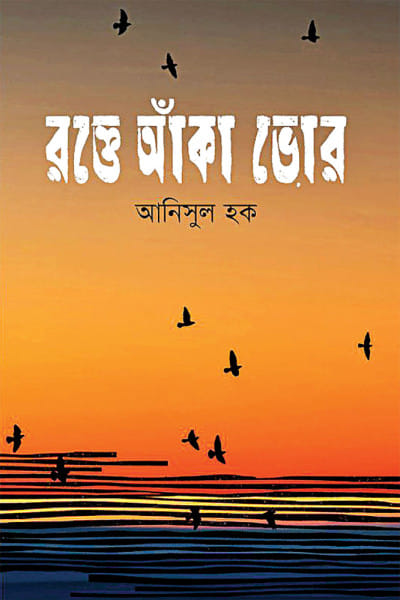Rokte Anka Bhor

The narration depicts how Pakistani troops take Sheikh Mujibur Rahman prisoner. From House Number 32 Begum Mujib takes shelter in the house next door. Amidst the ruthless and mindless killings, Bangladeshi soldiers, police, EPR, Ansar, and students build resistance.
Rokte Anka Bhor begins by depicting the events of the night of 25th March of 1971 and ends with Bangabandhu's return home on 10th January 1972. Anisul Hoque has not merely recorded a series of historical events. History can become monotonous, but Rokte Anka Bhor becomes personal and meaningful through moving narration and fragments of history.
Poet, writer, playwright, and journalist Anisul Hoque's novel Rakte Anka Bhor was published after five more books in the series. Comprising 127 chapters and 584 pages, the book is certainly more voluminous than most novels we see around these days. But then this novel churns out the fragmentary history of our Liberation War. Beginning on March 25, the storyline follows the journey of Bangabandhu Sheikh Mujibur Rahman. The author has assembled innumerable characters from history. Apart from Bangabandhu himself, there are the members of Bangabandhu's family, neighbors, housemaids, the four leaders, Awami League leaders, journalists, university teachers, Pakistani army officers, military rulers, and their staff, Indira Gandhi, Indian army, and civilian officials who assisted us, the US President and his advisers, policy makers from China and a few other international circles, Bangladeshi military officials, freedom fighters on the ground, great Biranganas, and representators from all walks of life.
Can a novel tell the story of a whole life? Some certainly can, and Rokte Anka Bhor is certainly one of them. Yet, at the beginning of the novel, Anisul Hoque humbly brings up his limitation. He writes, "1971' is such a big event that even if you write a million pages, not a single diagram of its full form can be fully erected." However, epics never capture all the events of such magnitude—they focus on the key events, the protagonist. Rokte Anka Bhor certainly does that focusing in the great leader, Bangabandhu Sheikh Mujibur Rahman.
The narration depicts how Pakistani troops take Sheikh Mujibur Rahman prisoner. From House Number 32 Begum Mujib takes shelter in the house next door. Amidst the ruthless and mindless killings, Bangladeshi soldiers, police, EPR, Ansar, and students build resistance. Sheikh Mujib is taken into custody in a West Pakistani jail, and his death sentence is being prepared in a secret military court. Muktibahini is formed. Rokte Anka Bhor is not cold history; it is more like that familiar journey that all Bangladeshis know of.
Here we also learn of many of the lesser known stories. We know of Prime Minister Tajuddin Ahmad in history, but Tajuddin, the father of Rimi, Simi, or Sohel, Tajuddin, the shadow of Mujib Bhai, has mostly remained behind the scenes!
Indian Prime Minister Indira Priyadarshini Gandhi is a very important character in this novel. Her compassionate demeanor and the keen political foresight are subtly brought about by the author. At the same time, the abominable behaviour of the characters in the Pakistani political arena has also come to light.
Another interesting thing to note here is that the author has brought the fairytale characters of Bengma and Bengmi They live in a banyan tree of Dhaka University. The author has revealed a lot of historical information through the Bengma and Bengmi dialogue. Their presence has given the novel a connection to the Bengali culture and authenticity.
According to Hoque, that dream of liberation is fulfilled on 10th January, 1972, when Mujib returned to the independent country from the enemy prison. The light of dawn finally shines on a blood-soaked country.
A must-read novel, Rokte Anka Bhor is like a journey backward, probing and knowing where and how this country was born.
The reviewer is a writer and MPhil researcher (Education) in the School of Education of Bangladesh Open University.

 For all latest news, follow The Daily Star's Google News channel.
For all latest news, follow The Daily Star's Google News channel. 



Comments